- Home
- Melissa Snark
Hook: Dead to Rights (Captain Hook and the Pirates of Neverland Book 1)
Hook: Dead to Rights (Captain Hook and the Pirates of Neverland Book 1) Read online
Hook
Dead To Rights
Melissa Snark
Contents
Acknowledgments
Book Description
Chapter 1
Chapter 2
Chapter 3
Chapter 4
Chapter 5
Chapter 6
Chapter 7
Chapter 8
Chapter 9
Chapter 10
Chapter 11
Chapter 12
Chapter 13
Chapter 14
Chapter 15
Chapter 16
Chapter 17
Chapter 18
Chapter 19
Epilogue
About the Author
Also by Melissa Snark
HOOK: DEAD TO RIGHTS
ISBN: 978-1-942193-29-6 (ebook)
ISBN: 978-1-942193-32-6 (paperback)
COPYRIGHT © 2018 by Melissa Snark
All rights reserved.
Nordic Lights Press. First Edition.
No part of this book may be used or reproduced in any manner whatsoever without written permission of the author except in the case of brief quotations embodied in critical articles or reviews.
Cover design by J Caleb Design
Contact Information:
Email: [email protected]
Nordic Lights Press
8781 Sheridan Blvd. #6010
Westminister, CO 80003
Published in the United States of America.
The author respects trademarks and copyrighted material mentioned in this book by introducing such registered items in italics or with proper capitalization.
This book is a work of fiction. Names, persons, places and incidents are all used fictitiously and are the imagination of the author. Any resemblance to persons, living or dead, events or locales is coincidental and non-intentional, unless otherwise specifically noted.
To my wonderful husband Chris.
Acknowledgments
I would like to say a huge thank you to Marie Brennan, author of the wonderful A Memoir by Lady Trent series. If not for the feedback and encouragement she offered at FOGcon's writing workshop, it's unlikely I'd have completed Hook: Dead to Rights.
This book couldn't have happened without the support (and saintlike patience) of my husband, Chris, and my good friend, Sheryl R. Hayes. They indulged my zany rambling and pirate tangents long after everyone else had fallen asleep.
Thank you to my editors, JD Book Services and Shay VanZwoll of EV Proofreading.
Thank you to Tammy Payne of Book Nook Nuts Proofreading.
Book Description
"All children, except one, grow up."
~J. M. Barrie, Peter Pan
Neverland is a wondrous isle of adventure.
Neverland is a cruel lie.
Children follow Peter Pan believing their dreams will come true—to never grow up.
Surprise, surprise… they never will. The children Peter Pan abducts are murdered or meet a grimmer fate.
I’m the child who escaped Peter’s treachery. I’ve made it my life’s calling to rescue the Lost Boys, even those who don’t wish to be saved. Now Pan has a schooner he’s using to steal even more children. I’m the only one who can stop him.
Call me Hook. I am the master and commander of a pirate ship, and I’ll have my revenge on Peter Pan if it’s the last thing I do.
Chapter 1
Frustration—Reminiscing—Unexpected Surprises
I am ink.
I was dark and messy, and got all over everything I touched, an indelible stain that never came out. Imagine... fingers threaded through wild black hair, a box-braid ponytail weighted with luminous pearl beads, a ruthless smile, and a blue steel hook in lieu of a severed left hand. I loved honey and thunderstorms, lied without compunction, lived without constraints, had a scoundrel's heart and a swashbuckler's flair. As a half-breed—human and mermaid—I belonged neither on land nor beneath the sea, so I carved my place in between. My home was a pirate ship named Revenge, her crew was my family, and together we roamed where the wind and waves took us.
My essence was the ink of an unwritten story, longing for the page.
I had a tale to tell, but I didn't know where to begin or how it would end. Of words, I had plenty, all of which sounded eloquent and profound in my head. Once written down, however, they were all wrong. My penmanship was clean and bold and legible, but the words themselves seemed the hackneyed scribblings of a madwoman. Crumpled pages littered the floor; the discarded bodies of repeated failed attempts.
That evening, the delicate strains of William Byrd flowed through the great cabin. The piano—played by Virgil Brown, the ship's minstrel—and our other musical instruments had a dedicated nook alongside the port hull. Mr. Brown would lend a sympathetic ear if I chose to seek his counsel, but I wasn't ready to admit defeat yet. Still I sat there, hunched over the writing table, a prisoner to troubled thoughts.
The empty journal mocked me. I gripped the quill pen like a dagger with thoughts of plunging it into the journal's heart. Oh, it was tempting. I wanted to do so, if only for the satisfaction it would bring. But ruining the book and the pen wouldn't solve my problem. I had a bad habit of destroying that which annoyed me. In fits of anger, I'd sunk ships and maimed or massacred anyone who crossed my path.
An aggravated snarl tore from my throat. I shoved my chair back and rose, thrusting the quill into the canister. Beside it, I found the cup of tea I'd long forgotten. I grasped the china saucer and plucked out the tea ball. The lukewarm beverage hit my empty stomach like a bitter medicinal shot.
With a grimace, I decided I needed something stronger so I ambled over to the bar. The ornate rug depicting the Tuatha Dé Danann absorbed the impact of my steps. The floor covering had been installed at Mr. Brown's request. He claimed it improved the acoustics of the room, though I suspected his primary motive had been to silence a particular creaky plank.
The piano recital suited the serenity of the evening. Through the stern windows, twin scythe moons hung in a sky of few and distant stars. The dark and tranquil ocean absorbed the moonlight.
Virgil painted pictures in sound. With the stroke of a harp, he could inspire sorrow or reverence. In his hands, a drum became a source of primal dread. I'd never understood how he infused such powerful emotions into song. In comparison, I would always be an amateur. A childhood malady had left me deaf in my right ear, but music was still my passion. I felt the rhythm in my bones—it soothed the savage beast that slumbered in my heart. Tonight, however, even Virgil's performance failed to penetrate my malaise.
The music's final notes faded away. A completed song, yet somehow it seemed a commentary on my outburst.
"Do you have something you wish to say, Mr. Brown?"
"I wouldn't wish to seem impertinent, Captain..." Virgil had a tired voice for a tired soul, but spoke without hesitation. He cracked his knuckles, which popped with a loud snap. Mr. Brown wore a raw ruby set in a gold band on his pinky finger, his only accessory. He'd told me once it'd belonged to his father.
I chuckled. "You do not seem impertinent. You are."
"Now, Captain Hook, no need to be surly."
"I'm always surly, and you're always so very circumspect with your improper queries into my private matters. I wonder when you'll finally get straight to the point."
"Never, Captain. I am who I am, and I'm too darn old to just up and change that now."
"To listen to you, you've one foot in the grave."
"Well, now. And here I
thought I had both feet firmly planted there," he said with a wry chuckle.
At the bar, I filled two tumblers with brandy. I raised one, shut my eyes, and inhaled. Good brandy must be savored before it's tasted. This was smooth and mild, a complex scent slowly unfurling. I raised a tumbler toward Virgil in a wordless offer, but he shook his head.
"Please pass me my medicine, Captain." Mr. Brown indicated a vial of salve on the bar with a trembling hand. He always shook except when he played, and then magic happened. The moment he caressed ivory keys or stroked vibrating strings, he was strong and steady. His competence extended beyond stringed instruments to wind. Those old lips breathed life into flutes and trombones.
I fetched the vial and removed the stopper since he always struggled with fine tasks. I nested the vial safely in his gnarled fingers. Afterward, I eased away to give the man his space. Despite his frailties—because of them—he took pride in his self-sufficiency.
"Do your hands hurt?"
"My hands always hurt."
Ask a stupid question... I sipped the brandy. It slid down my throat, smooth liquid flame with an underlying note of blackberry.
He poured infused oil into his palm and rubbed his hands together. A sweet, woody aroma laden with notes of pine and lemon infused the air. Frankincense. I couldn't smell it without thinking of Virgil. He personified a weary traveler, brimming with cynicism and wonder. Bright eyes and a scalp as smooth as a tumbled stone. A gentle soul, rarefied tastes, more than a little holy.
Virgil corked the vial and set it atop the piano. "I'll take that brandy now, if the offer's still open."
"Of course." I brought the second tumbler to him and settled on the bench beside him. In companionable silence, we indulged together.
Eventually, he cleared his throat. "So, knowing I'll take your secrets into the great beyond when I go, tell me your troubles."
"There'll be no great beyond for you, Virgil. You'll transform into music when you pass." I spoke without thinking and endured immediate regret. The crew would, no doubt, interpret such insipid nonsense as a sign of softness. I guarded constantly against showing even a hint of weakness. For both pirates and sharks, the scent of blood led straight to a feeding frenzy.
Virgil's jaw dropped. A profound and uncomfortable silence settled. To break it, I lurched off the bench and strode to the bar to pour another shot. Amber liquor sloshed into the tumbler, poetic and beautiful in its motion.
"Why thank you, Captain Hook, I'm flattered. I rather like the idea of being immortalized in my music."
"Don't go around telling others I said that."
"Of course not, I promise." He raised a hand in pledge.
I believed him, but not from blind faith in his integrity. In large part, the old man's prosperity depended on my patronage. On a pirate vessel, a musician constituted an unnecessary extravagance. Other captains had mistresses—I had a minstrel, and I kept him well.
Brandy and confidences flowed, and Virgil regaled me with a story about storytelling. Then an urgent rap sounded on the cabin door. A flush of annoyance warmed my skin. I glanced at Virgil, who gave an exaggerated shrug. Before I called out, the entrance flew on its hinges and smashed into the bulkhead.
First Mate David Starkey burst through the entrance. Breathing heavily, he bent forward so his long tiger-striped hair hung in his face. He had a predator's unwavering regard: gleaming green eyes with vertical-slit pupils. Orange and black stripes ran through his tousled hair, and continued along triangular sideburns to his jawline. In addition to cat's eyes, he had high, pointed ears, and the contours of his lower face suggested a muzzle. The animal traits were souvenirs from his years as a Lost Boy. Every child who had kept company with Pan eventually acquired the characteristics of a beast. Rumor held many of the wild creatures that dwelled in the Neverland Woods had once been children.
"Captain, I've sighted a ship!"
Chapter 2
Dangerous Obsessions—Unfortunate Tykes
In a smooth motion, I rose from my chair. Mr. Brown remained seated, as well he should. Aside from a pirate ship being his place of residence, matters of piracy were not his concern. Point in fact—I disliked subjecting an artist of his accomplishment to the cold brutality of the trade.
"Is it a mercantile vessel?" I asked Starkey. Naturally, I assumed he'd breached protocol for good reasons—a ripe prize, for instance.
Revenge earned a living preying on the vessels that strayed into the Neverland Sea. They hailed from around the world, representing a dizzying range of people and cultures. Perhaps the Devil's triangle pulled them through, or their course crossed dead waters. I'd studied it for years, but there was no discernable pattern, and thus no way to predict when or where one would appear. Such ships could vanish in a matter of seconds, so initiative became imperative. We maintained a constant state of readiness because minutes might make all the difference between loss and victory. If luck sided with us, this would be an East India Company fleet carrying tea or silk, both of which could be sold to the faerie folk for a good profit.
Starkey gathered himself, and instinctively I tensed. He thrust out his chest, and said the words for which I long and dread to hear. "No, Captain. It's Peter Pan."
Peter Pan.
I inhaled sharply. The mere mention of Pan's name breathed fervor into my obsession. A fire lit within me. Its flames seared away my thin veneer of humanity, exposing the savagery lurking in the depths. Starkey met my gaze, his tiger eyes aglow with ferocity. He had seen me at my best and my worst. We're kindred souls, he and I.
Mr. Brown, however, had a sensitive soul in need of nurturing and protection, especially from the likes of me. Reflexively, I glanced at the musician.
He tipped his chin and smiled. "I believe it's time I retire, Captain. My old bones are tired."
"Good evening, Mr. Brown." I offered a curt nod.
"A good evening to you and Mr. Starkey, too."
"Good night, Mr. Brown," Starkey returned with a lift of his whiskers. He gave the distinct impression of laughter, even though his tenor remained perfectly civil. He always appeared smug enough to beg smacking.
T'was part of his charm.
Pleasantries completed, I strode toward the entrance. Starkey had already wheeled. I followed on his heels and hurried to catch up. Annoyance edged my mood, because I sensed Starkey was withholding something important from me.
When we drew even in the passageway, I sidestepped, ramming my shoulder and elbow into his side. Starkey grunted and pushed back. The contest turned into a brief wrestling match. He and I stood about the same height; which was to say, I was taller than most men. Starkey had dense muscles and a full build, where I was long and lean. Neither of us were fully human, however, so our superior strength was an even match.
"What makes you think Pan is aboard this ship you've sighted?"
He chuckled. "You'll see."
"Maybe I don't want to see. Tell me." I shoved him against the bulkhead and pressed the smooth curve of my hook against his throat. A dense, dark, fragrant aroma surrounded him, and I could have identified him in total darkness by scent alone.
His hot breath huffed across the bare skin of my throat and his claws scraped across my forearms without breaking the skin. Such aggression from anyone else would've triggered my worst impulses, resulting in a bloody mess on the deck. But such was our trust.
We've been together that long.
"Telling you will do no good. You're too much of a cynic. You won't believe until you verify the truth with your own eyes." Starkey shook with the force of his silent snickering.
Blast it. He was right. He knew me that well.
I released and pushed him ahead. "Show me, then."
"Aye, Captain," he said, still laughing. He never stopped, not really.
Together, we ascended through the companionway to the poop deck, located behind the mizzenmast. The moment I set foot on deck, I pivoted, assessing the ship's status and conditions. Over time, the performance
of such evaluations became ingrained in the psyche of a successful naval commander. The final hour of the First Watch found the night clear and dark, the seas silky smooth, and a steady tailwind blowing at about fifteen knots.
Revenge was a warship designed for stealth and combat. Five hundred tons of grace and power, a hundred sixty feet long from bow to stern, thirty-two at her beam. Four masts supported six black sails. Her hull was constructed from ebonized oak and her decks were prized teakwood. On moonless nights, she vanished from view—shadows layered over shadows.
She had fangs and claws, this lovely vessel of mine: twenty-eight cannons, sufficient firepower to blast the gates of Hades off their hinges, and a crew of seventy bloodthirsty buccaneers. We were a veteran warship. The gun crew had affection and admiration for our artillery. Each cannon had a name engraved on its trail and the crew spoke as though the guns were people. "Oh, Jumping Jack has a real kick today," they'd say. Or, "Talia, she's my favorite gal, always fires straight and true, she does."
We sailed northeast toward Neverland. Mr. Smee, the Irish bo'sun, manned the helm, gripping the wheel in his chubby fingers. From the highest point in the rigging to the lowest depth in the hold, the mood of the ship churned with restlessness. The many eyes and ears of the crew sensed something amiss.
"Evening, Captain," Mr. Smee called out in a voice quivering with anxiety, presumably over my appearance on deck at such an odd hour. Admittedly, I seldom broke from my routine, but it took little for the man to work himself into a tizzy. A spot of bother reduced him to jitters.

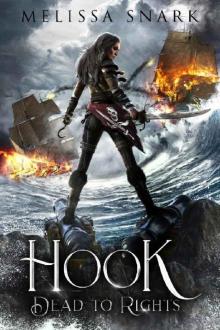 Hook: Dead to Rights (Captain Hook and the Pirates of Neverland Book 1)
Hook: Dead to Rights (Captain Hook and the Pirates of Neverland Book 1)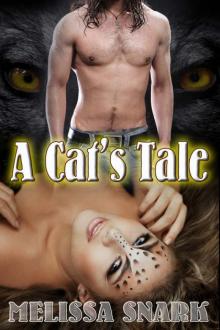 A Cat's Tale
A Cat's Tale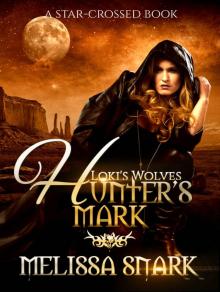 Hunter's Mark: A Star-Crossed Book (Loki's Wolves 0)
Hunter's Mark: A Star-Crossed Book (Loki's Wolves 0)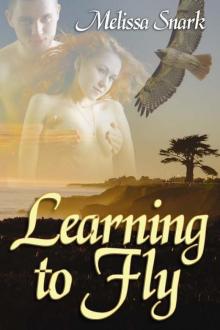 Learning To Fly
Learning To Fly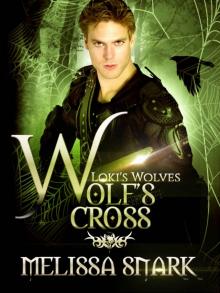 Wolf's Cross: Book 4 (Loki's Wolves)
Wolf's Cross: Book 4 (Loki's Wolves)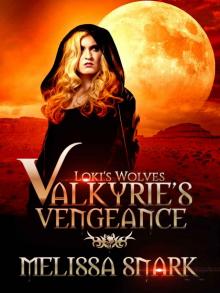 Valkyrie's Vengeance: Book 1 (Loki's Wolves)
Valkyrie's Vengeance: Book 1 (Loki's Wolves)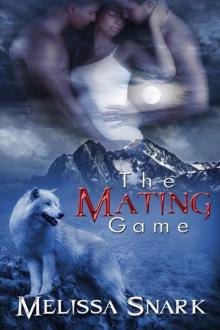 The Mating Game
The Mating Game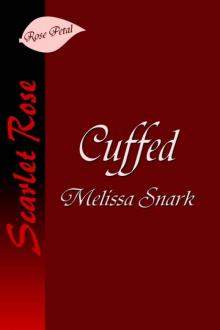 Cuffed
Cuffed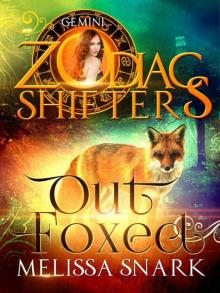 Outfoxed: A Zodiac Shifters Paranormal Romance: Gemini
Outfoxed: A Zodiac Shifters Paranormal Romance: Gemini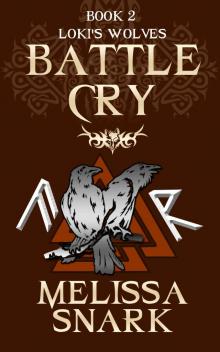 Battle Cry (Loki's Wolves Book 2)
Battle Cry (Loki's Wolves Book 2)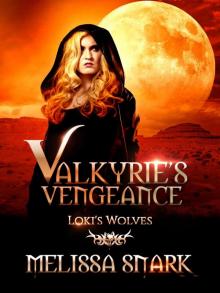 Valkyrie's Vengeance_Loki's Wolves
Valkyrie's Vengeance_Loki's Wolves